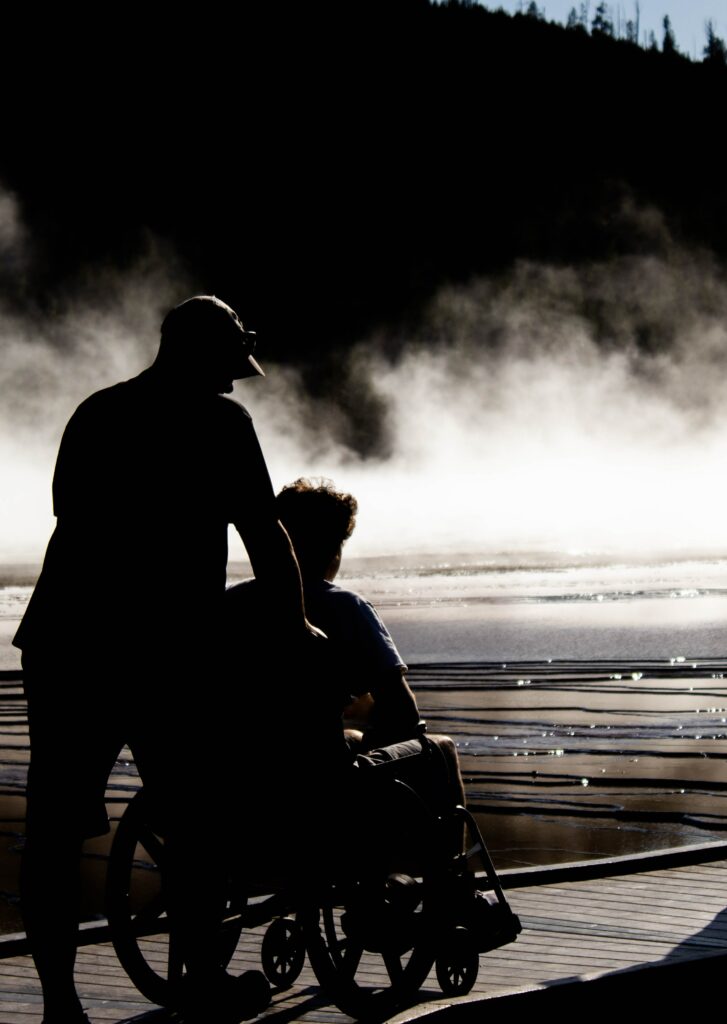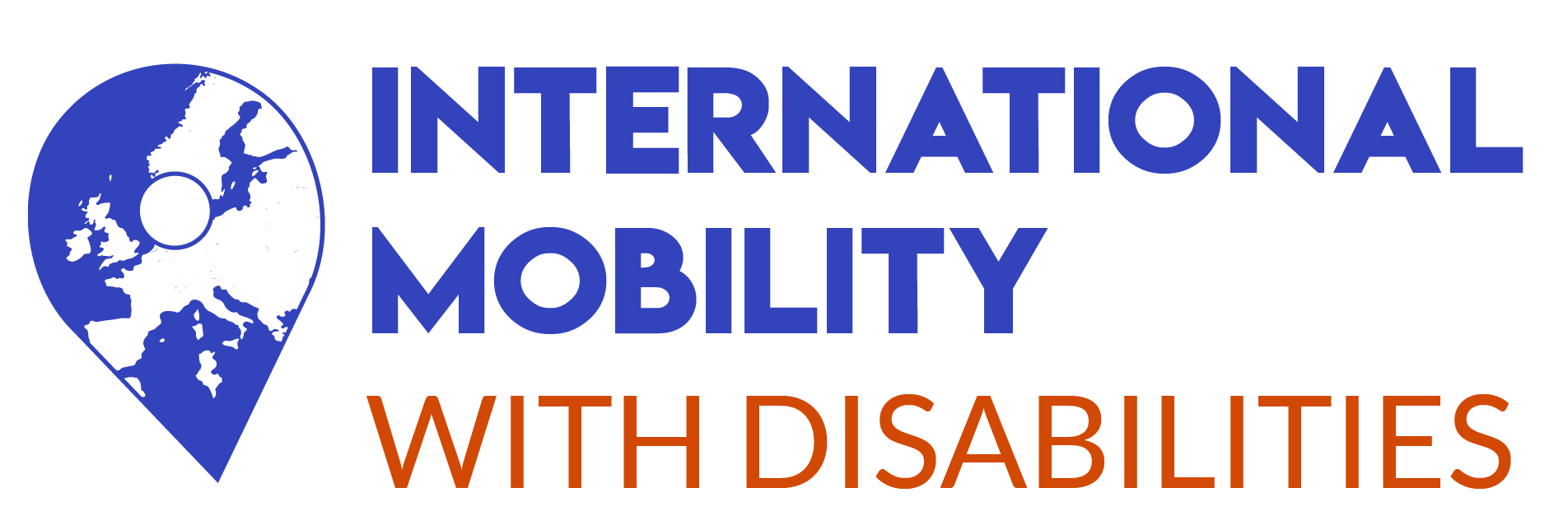Three curative education nurses got to know each other during their training in Berlin and have since been working in various contexts in the field of care for disabled people. We would like to thank them for the interview.
M: Mark, 30, from Berlin. I’ve been working in disability aid for 10 years, starting with the FSJ* and then training to become a curative education nurse, where I mostly took on care assistance jobs. Here and there I have also accompanied vacation trips for people with disabilities, and as part of the assistance I have been on several vacation trips with my beneficiary.
F: Fabian, also 30, I trained as a special needs nurse and didn’t have much to do with the subject before. I then worked in outpatient living, exclusively with mentally disabled people. I have also taken several vacation trips within Germany and also heard about travel plans that people wanted to do. For example, I once tried to plan a trip with two different beneficiaries, just theoretically. Without it now being a matter of putting it into practice. But simply looking at what is needed for it in the first place?
P: Pia, 29, I started my training as an educator in 2013, did it for three or four years, and during that time started working in individual case support for a 14-year-old with trisomy21. Then I started my training as a curative education nurse and later worked in supervised individual living. During that time, I supervised a trip with people who are physically and mentally and psychologically disabled for three weeks, to the Harz Mountains, and during the course of my employment in assisted individual living I helped supervise two group trips within Brandenburg.

So you have all been on at least one trip, or have been on the road with people with disabilities. What was it like, where were you, what did you do?
F: There are different perspectives. Shall I start?
M: As you like.
F: I’ll start. When trips are coming up, there are two options: either you design it yourself as a project and say, “Okay, we have such and such a contingent from the sponsor and can make a trip with it, together with the people”. Then you can really sit down with the people in the care situation and plan it. Or there are prefabricated travel structures, two weeks of care to Greece, Athens, whatever. But this is usually very expensive.
The trips themselves were always quite stressful for me as a caregiver, because you don’t have breaks. You don’t have these 8 hours of work or 10 hours that are paid because those are then paid at the maximum. And everything beyond that is then free time, so to speak, breaks. But in practice there are not breaks. If you’re there with the people for two weeks, you’re there with the people 24/7 for two weeks. So maybe once or twice you can take a little time off but only for one or two hours.
M: It is always very pre-structured.
F: You were already so constricted, you couldn’t get out of Germany because there wasn’t enough money. What I observed is that if one thing was done well enough, it was repeated every year. Here is an example: Yes, okay, one year on the camping site in North Rhine-Westphalia, then it’s done ten years in a row, without anyone getting the idea to do it differently.
M: And to answer to the wishes of the individual people
F: The idea is to make the staff understand that they have the choice. So it’s up to me to convey to the person that we don’t have to go to a campsite for the tenth year in a row, but we can also suggest to the group to do this and that. And in my opinion, you have to take initiatives. Give people the choice, and allow people to have a different idea in the first place.
P: What could also help is that responsibilities change within the team so that we don’t do the same things again and again.
F: Mark, maybe you can tell us about your experience in accompanying a single person, i.e. in personal assistance?
M: Yes, so for one or two weeks I, or rather we, the two of us, two assistants, accompanied our beneficiaries somewhere at the seaside, I think at the Baltic Sea, and that was actually two weeks of work. 24 hours were also paid, mostly by the office.
P: Through the personal budget?
M: Yes, exactly, through the personal budget. And yes, that also felt similar, you had little free time, because both of you shared the complete care for one person. And that is then also very intimate and close and thus also quickly becomes conflict-laden.
The direct physical dependence on the person providing the assistance plays a role here, when the beneficiary sometimes doesn’t want to have anyone around, but has to. And I also very often encountered emotional conflicts with the person. Then my emotions as an assistant came through here and there – because you can’t separate them completely – yes, there were difficult situations from time to time.

If you were on the road for two weeks – if you calculate very simply now – you have twelve hours of work a day, for two weeks. Is it really twelve hours?
M: It was more divided into two or three hours of basic care in the morning, and then at noon and in the evening, we took turns. And otherwise it was just sometimes, two hours on the beach pushing her wheelchair and going on vacation and sitting around and drinking coffee.
F: But still, as an assistant you can never get into this vacation mode mentally.
M: Yeah, well, you’ve had three hours off where you could go off and do your stuff, but you were on call. So if the beneficiary needed to go to the bathroom, yes, you were always on call.
F: And you always had to be available.
M: Well, there were two of us on the trip.
F: Oh yes, that’s right.
M: Ask another question (laughs).
Yes, I have a question, but for Pia. Do you always have to be there when the group trip starts?
P: Yes. You already say yes to a job so you have to make yourself available 24/7 if needed. When you go on a trip, you already agree that you will always be on call.
How does the organization of such a group trip work?
M: Well, an association with which I have already planned two group trips for adults also offers group trips in different age groups. There are starting from eight, nine.
F: Do they do this as an open offer, or does it run under their sponsor?
M: No, it’s a trip planned by the association, they just hire people to accompany them and do the organizational work. And the travel planning then goes to the accompanying persons. The travel management coordinates everything and distributes tasks and sees to it that the vacation is planned a bit in advance. The people and travelers meet beforehand in order to get to know them and, if possible, to arrange the vacation on the basis of their interests so that everyone gets their money’s worth.
Have you already had bad experiences?
M: I have had bad experiences with colleagues who patronized the vacation and the activities. Example: There was a World Cup at the time and two travelers wanted to watch, the rest didn’t care. And then they pressured people all the time to watch games with them. But it was more from the attendants than from the travelers. Now, in retrospect (I didn’t have that much experience back then), it’s already their trip… But determination makes the frame. (looks at Fabian) That was also a bit the case with yours.
F: Yes, because actually it’s about: What possibilities do people have? And what possibilities exist to accompany such a trip as an outsider? And you say, for example, that people are not necessarily trained in the profession.
M: If a trip lasts two weeks, I have exerienced that especially unskilled people in such a travel company have come to their limits. That’s also because of this 24-hour standby.
But it never has to be as hard work as it is with some unorganized carriers. That was my go-to point. If the organization is good, then you can also bring in assistants and career changers. Which also refreshes the whole thing. Because I think you usually don’t need 100 percent trained professionals to start a pedagogically valuable journey.
F: Exactly.
M: I have also had very good experience with untrained staff but they just did a super emphatic job, so intuitively simple. And they were also open to help and whatever else. And that is more a question of character or an attitude towards the matter.

What else is important for the organization in the team?
P: I think the mission statement is really important: That is, how do we deal with general or certain, concrete things? What is my role? What kind of pedagogical mission do I actually want to fulfill? Such mission statements, which are either set by the sponsor or by the association that carries out this trip; or the team itself, which then finds itself spontaneously, must agree on certain things. For example: What is my pedagogical mission? For example, do I have to teach Elke how to hold a knife properly at the breakfast table?
F: Or that she can only drink one cup of coffee.
P: Or that she can only drink one coffee. Or have I coordinated with my team in advance: What are guiding principles? Where are any pre-existing conditions, who has diabetes, who tends to empty the refrigerator at night? I also clearly define where I limit self-determination. And that is simply a very, very important point. I believe that when this is clarified in the team, it has a considerable influence on the journey and how it is perceived. I think that is very important and I would insist on that as a person, how I would like to approach a journey as an accompanying person. Are you here now to teach people some goal or just to have a nice time and meanwhile just give a loose framework.
As an accompanying person, how do I know what your pedagogical mission is?
P: As an accompanying person in a travel context, I find it incredibly important to agree on goals with the people I have in front of me. I have a bond with that, a relationship, and I set goals or also boundaries with that. Announcements, clear boundaries and clear lines can be better followed than spongy lines. And it doesn’t have to be all planned out, but simply: these are my limits, these are your limits. What have we set as a goal here? Something like this. To set a framework, a framework in which we can move. I think that’s very, very important. Exactly the same goes to the team: to set a framework, a playing field, with which I know where I can move. It’s easier for everybody involved.
And we had a beneficiary meeting every month in the assisted single living where I worked, where all the residents or beneficiary of the assisted single living could come together and vote on exactly this kind of thing: What do I want from the next trip? A protocol was issued and everything was made very transparent. I thought that was very, very good.
I think that is my final sentence: No matter with which beneficiary, no matter with which age, origin or even according to the social code article, you can’t expect people to take responsibility if you don’t give it to them. You give the beneficiary a small kind of responsibility and then they can have a say in that journey and that’s the most important thing. Point.
F: I think two more things are important. One is that it’s always a cost issue as well. If you receive certain social benefits – now from the perspective of beneficiaries – you are only allowed to save a certain amount. This means that certain recipients of benefits are not allowed to go on certain trips because they are not allowed to save up enough to be able to afford them. That’s a problem.
M: Yes.
P: Yes.
F: That means you’re not able to finance your own travel from the ground up. And the second point that also follows on from that, which I think is most important, is that often access to one’s rights can happen through the assistance – hopefully – if the assistance is doing its job. So that means I can communicate tot he beneficiary his or her rights by translating them well.
How a trip turns out depends, I think, very much on the assistance structure as a whole and how much people around you are committed to cobbling together the best possible package for you. From my experience, the assistance has a lot of influence on how great the trip can be for the person. Because the assistance can also implement what the person wants at that moment, preferably with the help of the person himself. And if you do an unsatisfying job, but stand there and say “Yes, the main thing is that we are going somewhere”…
M: “The main thing is that I get off work quickly.”
F: Exactly, then the mission is just not fulfilled. The barrier becomes even greater to shape it. The question that is at stake – and that we should always ask ourselves – is: What can you do to make the journey awesome for people? That is, after all, the question at hand.
* FSJ is an opportunity in the Federal Republic of Germany to spend one year volunteering for little money while having a learning program and orienting oneself professionally.
